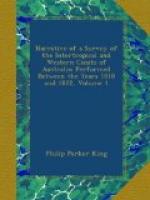The only edible fruit that we found was a small black grape: it bore a very inferior resemblance to the common sweet-water grape, but the leaf and habit are altogether different.
The centre of the bay is formed by a sandy beach; it is terminated by cliffs of about forty feet in height, the upper stratum of which appeared to be an indurated clay of a very red colour, occasioned by the ferruginous nature of the rocks and soil; the lower part is a stratum of the whitest pipe-clay, the upper limit of which, from the surface having been washed clean by the late rains, was so defined and produced so striking a contrast in point of colour as to give the whole a most remarkable appearance.
At the distance of ten miles behind the beach of the mainland, which is very low, there is a continued ridge of rocky hills which was named Wellington Range, and behind them is the Tor, a remarkable rock that stands alone. The range is about twenty-five miles in extent, and its summit has a very irregular outline; it is visible for eight or nine leagues.
March 28.
The morning after our arrival a baseline was measured upon the beach for the survey of the bay, and whilst we were thus employed our people found and brought to me several traces of Malays, who, as we are informed by Captain Flinders, make annual visits to this part of the coast in large fleets, to fish for beche de mer.
Among the relics were old broken joints of bamboo, which the Malays use to carry their water in, some worn out cordage and a coconut, which had perhaps been left behind by accident. The traces appeared to be of so recent a date, that we conjectured the fleet was but a short distance to the eastward of the islands, and as the easterly monsoon had commenced, we were naturally in daily expectation of being overtaken by them. Our operations, therefore, were hurried, since we could not tell what might be the result of encountering them, as we were totally incapable of defending ourselves, should they be mischievously inclined. A look-out was therefore kept for their approach, and our people were held as much as possible within sight, so that we might be prepared to weigh and leave the place as soon as they should make their appearance.
The hole which had been dug for water was half full, but it was so brackish as to be quite unfit for use.
Upon further search a small pond was found by Mr. Cunningham in a hollow, at the back of the beach; but in the course of the day a run of water was discovered by Boongaree, at the north end of the beach, oozing out from the base of the pipe-clay cliffs, which proved upon examination to yield better water than the former, besides being very much more convenient to obtain.
Our wooding-party commenced operations the day after we arrived, and, on their returning on board at night, imprudently left their tools on shore.
March 29.




